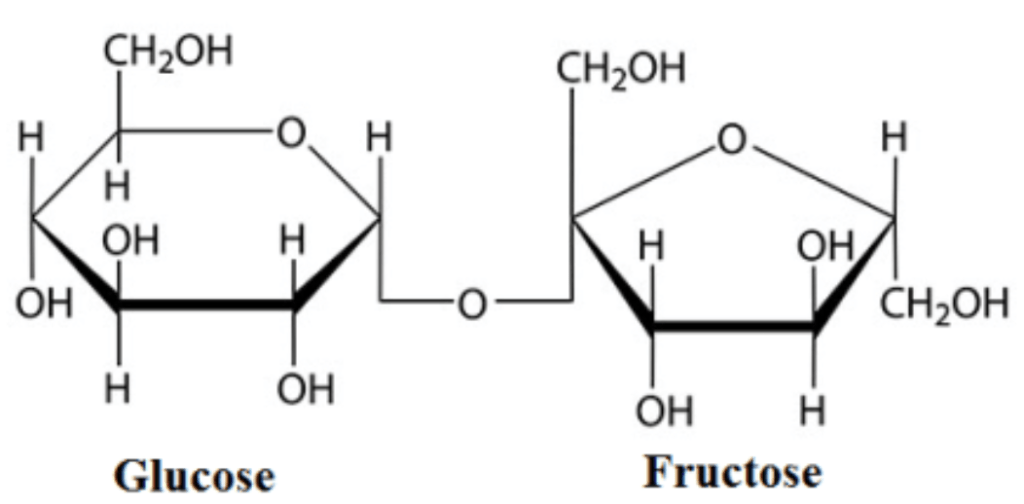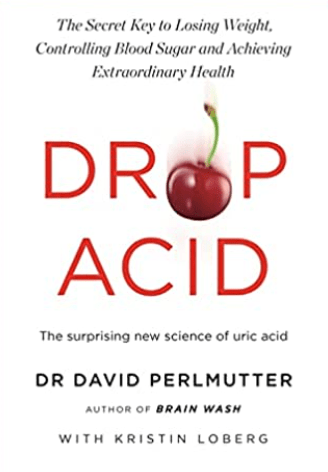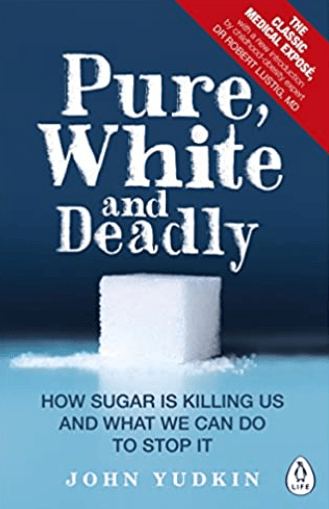By John Pickard
In part 1, we looked at how carbohydrates in general are more refined and available in greater abundance than they were in the ‘primitive’ diet when human metabolism was evolving. In this section we look at the most damaging carbohydrate in the modern diet: sugar.
Sugar is worse than dietary starch in that it is absorbed even more quickly. It is not for nothing that we refer to a sugar rush when children eat sweets and develop a sudden surge of boundless energy.
‘Sugars’ are actually a group of similar chemicals, but what we call ‘sugar’ in everyday language – the white crystals we put in coffee – is sucrose. A sucrose molecule is made of only two smaller linked molecules, glucose and fructose (‘fruit sugar’). (See diagram below). This link is easily broken and therefore taking in pure sugar will lead to the absorption of glucose extremely rapidly and a rise of blood glucose levels (what is usually, and confusingly, called ‘blood sugar’). As we have explained in part 1, spikes in blood glucose create a significant insulin response.

Sugar also has the unfortunate property of triggering a reaction in the brain, with the release of dopamine, a hormone associated with pleasure and enjoyment. Sweet things are ‘more-ish’ because of the dopamine effect: it is literally possible to become addicted to sweet foods. Another side effect of dopamine release is feeling hungry. The worst type of foods to have this effect are this are those with a high content of both fat and sugar, like doughnuts, cakes and biscuits.
Fructose causes liver disease
The other half of the sucrose molecule – the fructose – also has to be metabolised in the human body and it brings many problems of its own. It is metabolised independently of glucose and insulin and some of its effects include laying down fat in internal tissues and specifically the liver.
Fructose can produce liver disease not dissimilar to the effect of excessive alcohol consumption. Fructose is even more of a poison than sucrose, but it is handy for food manufacturers because it can be labelled ‘sugar’ (because it is one) and it tastes twice as sweet as sucrose.
In the USA there have been big drives by the producers of corn to get food manufacturers to add corn syrup, fortified with fructose (High Fructose Corn Syrup, HFCS) to processed foods. In 2015, there was a huge spat between two big opposing lobbyists – the Sugar Refinery Association (sucrose) and the Corn Refiners Association (fructose).
When ‘Big Corn’ and ‘Big Sugar’ geared up for a multi-billion dollar court battle that year, over whose product was the most poisonous, they each began to publish the scientific dirt on their rival – something that was easily do-able, because both products damage health. But the court case hadn’t gone ten days before the two industrial giants realised that there was a danger of the public wising up too much, so they dropped the case and came to a mutual compromise, the terms of which were (of course) confidential.
Nowadays, ‘corn syrup’, which is rich in fructose, is produced in vast quantities in the USA and liberally added to many processed foods. It is in muffins, biscuits, cereals, yoghurt, sweets, soups, cakes, cooking sauces, and through them in pizzas, fast foods and sandwiches. What is labelled ‘sugar’ in soft drinks is often mostly fructose.

Dr David Perlmutter (author of Drop Acid) points out in his book that in the USA in the early 1900s the average intake of fructose was 10 grammes a day, and most of that from natural sources like a handful of blueberries. Today, it is over fifty grammes, and mostly from processed foods. Unfortunately for the American working class, High Fructose Corn Syrup is subsidised by the taxpayer, whereas broccoli, carrots and other healthy vegetables are not.
Which ‘sugar’ is in your processed food?
Fructose is not used in Europe as much as it is in the United States, largely because what Americans call ‘corn’ – maize – isn’t grown over here. But it is still an additive used to some extent in foods in the UK, often in the form of ‘glucose-fructose syrup’. A quick look on supermarket shelves will show that McVities biscuits like Jaffa Cakes and Hobnobs have this additive.
One of the problems is that it is difficult to trust food manufacturers to reveal all. When you look at the label on a bar of chocolate or a jar of cooking sauce, are you really being made aware of how much of the ‘sugar’ content is sucrose and how much is fructose?
The manufacturers of sugar and corn syrup, meanwhile, are really onto a good thing. Almost every type of processed food has added sugar. It is ubiquitous. It is more than 50% of a Mars bar and while we might expect that, sugar is also 5-7% of ‘healthy’ snack bars. Even so-called ‘savoury’ foods have sugar added.
Food manufacturers know that a product with added sugar will tickle the dopamine glands and so will ‘taste’ better and be more likely to be bought again. There is no other earthly reason why there should be sugar in bread, baked beans, soups, cooking sauces, and so many other items, but it is, and as a result it is the main contributor to the epidemic of obesity and diabetes.
After pressure from medical authorities – and dentists, who have long recognised the link between tooth decay and sugary foods – the UK government was eventually dragged kicking and screaming into introducing a modest tax on sugary drinks in April 2018. Drinks manufacturers resist taxes or even public education on the iniquities of sugar and Liz Truss was going to dump the sugar tax in drinks before she was dumped herself. It remains to be seen what Sunak will do, but he is no less in the pocket of the big food companies as any other Tory Prime Minister.
The more ‘processed’ a food is, the worse it is
As a general rule, the more processed a food item is, the worse it is for health. The best diet in modern times is one that corresponds most closely to the diet that provided the context for human biological evolution – with minimal unrefined carbohydrate and a rich mixture of plant-based food, including nuts, seeds, fruit and vegetables; the greater the variety the better.
Unfortunately, supplementing a modern carb-rich diet with fresh fruit and vegetables, something that would mitigate the damage done by the carbs, is very difficult for some people. In some deprived inner-city areas, particularly in the USA, ‘fast food’ outlets are everywhere, but they are ‘deserts’ when it comes to cheap fresh fruit and veg. The conditions of everyday life for some workers mean, in other words, that they are simply unable to access a healthy diet and cannot afford it even if they could.

The vested interests of food manufacturers – those who process food into the least nutritious and most unhealthy form possible – are the biggest single stumbling block to improvements in public health. They make more profit, the more they process food. They would much rather sell something processed, many times over if necessary, than something unrefined or unprocessed: because there is less profit to be made in a ‘natural’ product. Why sell an almond, when they can sell an almond ‘bar’ or ‘almond-flavoured’ cakes and make more profit on it? Why sell a piece of fish, when they can sell ‘fish fingers’ covered in sugar? Why sell a piece of chicken, when ‘chicken twizzlers’ make more money?
Food companies have massive political clout
What the food manufacturers sell may contain a ‘balance’ of energy and sometimes even protein or vitamins and minerals, but that doesn’t make it healthy. While they make profit, workers pay with poor health and pay again through medical treatment, creating a huge strain on the NHS.
On the other side, of course, the big pharmaceutical companies are happy to make lots of money selling drugs for the treatment of all of these non-communicable ‘diseases’, like diabetes, high blood pressure and obesity. A huge percentage of the elderly population are on statins, much to the delight of the pharmaceutical giants, and to great cost to the NHS, whether or not they’re effective – and there are doubts on that score.
This is clearly a political issue because the food companies who are responsible for trashing public health have a massive influence on politics and politicians and if it challenges their profits, they use their influence to oppose any measures that might mitigate the effects of poor diet. The Tory Party for all intents and purposes is in the pockets of the big food companies.
The big food monopolies like Associated British Foods, Unilever, Nestle and so on, are big economic players. The Food and Drink Federation like to present a ‘democratic’ face – claiming to speak for over 11,000 businesses – but the bulk of its £110bn-plus turnover is dominated by a handful of giant corporations, not your corner shops. The biggest manufacturing and retailing companies have immense political clout. An academic paper published in June this year gave a glimpse of the lobbying that goes on behind the scenes.
Public Health England called for reduction in sugar content
The paper listed scores of meetings between representatives of these businesses, food producers, processors and retailers of every kind. Some of the big individual companies by themselves had more than 25 meetings with ministers or policymakers over a fourteen month period. Meetings are listed, but many other “interactions” go on, the paper says, “beneath the radar”. The top seven US food companies spend over $25m a year on lobbying alone – and note: this is not advertising, which is billions more.
Every time there is a suggestion from the medical professions about some government measure to monitor or regulate food, or to regulate advertising in the interests of general public health, you can be sure that a huge lobbying machine will swing into action to defend the profits of the big food companies.
In 2017, Public Health England (PHE) called for a 20% cut in sugar content in all processed foods 2020, with 5% being the target for the first year. However, as is the norm with Tory governments, the proposed changes were ‘voluntary’ and in the first year, the PHE later reported, food manufacturers and supermarkets had only managed to cut 2% of sugar content. It is an uphill struggle all the way, as the entrenched vested interests of food manufacturers block every progressive measure proposed.
In 2018, Sadiq Khan, the Mayor of London banned the advertisement of junk food on all parts of the underground and bus network. At the time, it was opposed by the usual suspects in the mainstream media. An evaluation of the press reaction at that time, by the London School of Hygiene and Tropical Medicine, found that scores of newspaper and website articles opposed the policy.
Articles arguing against the ad restrictions focussed on two main claims: that child obesity was not the ‘right’ priority; and that the restrictions were not an effective way to address child obesity. Some even disputed the science behind the restrictions.
Tobacco companies actively fought the science
The findings of the LSHTM study, according to Fran Bernhardt, Children’s Food Campaign Coordinator, Sustain: “These findings demonstrate that the unhealthy food industry used the media to undermine public health policy. The junk food industry, alongside tobacco, alcohol and gambling lobbyists use these techniques to manipulate public opinion, put pressure on policymakers and ultimately see their profits prioritised ahead of children’s health”.

As it happens, Khan’s advert ban did have an effect in reducing the incidence of obesity in London, something that was even admitted in an article in the Mail on Line in August this year. There are nearly 100,000 fewer obese people in the city today compared to the years before the advert ban.
Few people nowadays would deny that the big tobacco companies used fake ‘science’ and that they blocked scientific research that linked smoking to lung and heart disease. They played a disgraceful role and were directly responsible for the untimely deaths of millions of people who smoked themselves to death.
What we have today in the lobbying and lying of the food industry is no less damaging to public health than the tobacco industry in the 1950s and 60s. Big Sugar and Big Food are making massive profits every year by making millions of people ill.
No-one would suggest that it would be easy to shift the daily eating habits of millions of people – or hundreds of millions across the globe – from a damaging modern diet to a scientifically-based and healthier diet. There are very sound environmental reasons why we need to move to a more plant-based diet, although that is beyond the scope of this article. But we cannot even make a start on these changes as long as a handful of big companies rule the roost and effectively dictate the diets of millions of people.
As Left Horizons has argued, socialist policies on climate change must mean the democratic public ownership and management of energy producing and distributing companies, so they can function in the interests of the population as a whole and the future of the planet. There is a direct parallel with food. There can be no resolution to the global problem of obesity and similar non-communicable diseases without the democratic social control of all food production and distribution out of the hands of private interests and owners.
Food is an essential element of daily life and its production and distribution should no longer be organised in such a way as to profit a handful of billionaires. It urgently needs to be organised so as to bring the greatest benefits to the largest number of people.



